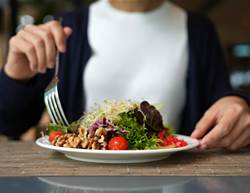Cycle syncing: you might have heard the term, but what does it actually mean? Basically, it involves tweaking your lifestyle to coincide with different stages of your menstrual cycle: rethinking what you eat, when you sleep, when you exercise and even when you take on new projects. Studies do show that hormone fluctuations affect our energy, mood, appetite and sleep. While still light on scientific research supporting the theory, there is some suggestion that small changes to our routines could have beneficial effects, unlocking extra reserves of energy or resilience when you need it most, and helping you meet the hormonal needs of your body to make your menstrual phase easier to manage.
How does it work?
Our hormones ebb and flow over the span of four weeks (or an average of 28 days), biologically dividing our menstrual cycle into four distinct phases. Those in the know suggest approaching each phase as follows:
Menstrual (days 1-5)
You’ve got your period. Energy levels are low.
- Focus on light exercise, such as walking, yoga and stretching.
- Limit your intake of fat, salt, alcohol and caffeine. Instead, drink and eat warm, comforting, anti-inflammatory food: teas and foods rich in iron, omega-3s and vitamin B12.
- Focus on rest and nutrition.
Follicular (pre-ovulation, days 6-14)
Our energy and mood levels are often higher during this time than in the second half of our cycle.
- Do light cardio.
- Eat more leafy greens and cruciferous vegetables, such as broccoli and cabbage, that are high in fibre and zinc.
- Use this phase to make to-do lists, embrace creativity and plan.
Ovulatory (days 15-17)
- Focus on high-intensity exercise: try HIIT, dance classes or Crossfit.
- Eat anti-inflammatory foods like whole fruit, vegetables and almonds.
Luteal (post-ovulation, days 18-28)
The last phase of your cycle before you start menstruating again. Try:
- Light to moderate exercise. A session of yoga, pilates or even meditation can help combat dips in mood.
- Increase heart-healthy fats, such as avocado, salmon, olive oil and nuts. Avoid junk food and sweet treats.
- Be aware of the possibility of mood swings, anxiety and period pain or premenstrual syndrome (PMS) in this phase.










